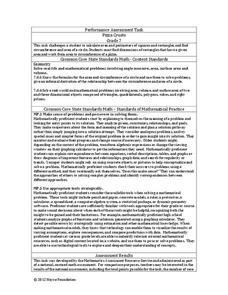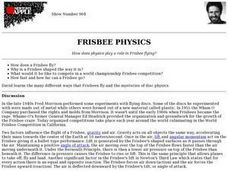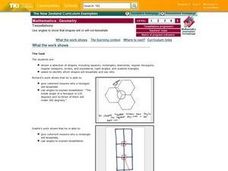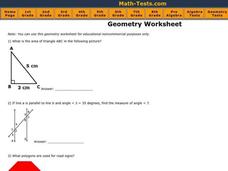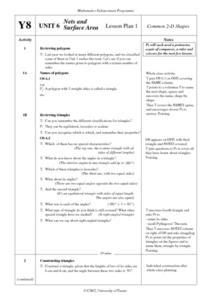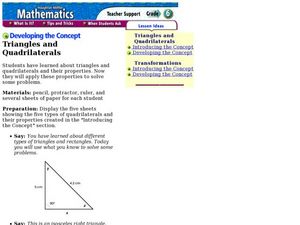Cornell University
Constructing and Visualizing Topographic Profiles
Militaries throughout history have used topography information to plan strategies, yet many pupils today don't understand it. Scholars use Legos and a contour gauge to understand how to construct and visualize topographic profiles. This...
Curated OER
Flexible "Glass" Sculpture
Older artists create 2-dimensional surfaces with paint, then use these paintings as the components of a 3-dimensional sculpture. They assemble a free-standing sculpture that may be viewed from any angle by using wire to create the shape....
Curated OER
City Streets: A Fold-up of a Street Lined with Buildings
After walking in a nearby neighborhood, have your class create this amazing city street pop-up. They study the facades of the buildings they see, focusing on geometric line, shape, and architecture. They then draw, cut, and create a city...
Yummy Math
Parametric Equations and a Heart
Trigonometry, art, and Valentine's Day come together in a creative activity about parametric equations. Learners calculate several equations before graphing them either by hand, on a graphic calculator, or Excel spreadsheet to curve...
Noyce Foundation
Pizza Crusts
Enough stuffed crust to go around. Pupils calculate the area and perimeter of a variety of pizza shapes, including rectangular and circular. Individuals design rectangular pizzas with a given area to maximize the amount of crust and do...
Curated OER
Geometry House!
Fourth graders use computer drawing tools to create a house of geometric shapes.
Curated OER
Sports and Geometry
Students investigate shapes in sports. In this geometry instructional activity, students identify geometric shapes in sports equipment, fields, etc. Students present their findings.
Curated OER
Who Am I? (Middle School)
Third graders complete a classroom game used to build understanding of two and three-dimensional shapes. Diagonals, sides, regularity, congruency, angle measurements, parallels, perpendicular, faces, and edges are a few of the vocabulary...
Curated OER
Origami Frogs
Ninth graders explore a variety of geometry and science concept while making an origami frog. The fold paper into the shape of a frog and conduct measurement activities including frog leaps.
Curated OER
Reflections
Fourth graders become familiar with the use of the Geometer's Sketchpad. They examine and practice creating geometric shapes. Students identify shapes and explore the introductory functions of the Geometer's Sketchpad. They complete...
Curated OER
Introducing Polygons
In this polygons worksheet, students name the 6 different colored shapes, choose any 3 polygons to draw and color on a grid, while adding a right angled triangle and a rhombus.
Curated OER
Frisbee Physics
Students explain how a Frisbee flies, why it's shaped he way it is and how fast and how far the Frisbee can go.
Curated OER
Brain Teaser - the River
In this perimeter and area worksheet, students find the perimeter and area of shapes with right angles. Students complete 9 problems total.
Curated OER
Talking About Your Name in Math Terms
Add imagination and creativity to your math lesson. Young mathematicians investigate ways to express their names in mathematical terms. For instance, they can count the number of letters, analyze the geometric shapes of the letters, or...
Alabama Learning Exchange
Trapezoids: What's Equal or Right About Them?
Pupils explore the concept of trapezoids. In this trapezoids instructional activity, learners identify legs and bases of a trapezoid. Pupils discuss the similarities and differences between isosceles trapezoids and right...
Curated OER
Tessellations: Use Angles To Show That Shapes Will or WIll Not Tessellate
Students observe a selection of shapes. They identify which shapes will tessellate and justify their answer. Students apply the symmetry and angle properties of polygons to create tessellations.
Curated OER
All About Quadrilaterals
For this all about quadrilaterals worksheet, students interactively answer 10 multiple choice questions about quadrilaterals, then click to check their answers.
Curated OER
Triangles
In this triangles worksheet, 10th graders solve 10 different problems that include determining the measurement of various angles. First, they determine the area of a triangle illustrated on the sheet. Then, students use the picture to...
Curated OER
Quadrilaterals and Other Polygons: Practice
In this polygons learning exercise, learners classify each polygon in as many was possible. Students then write polygon or not a polygon to classify each figure. Learners find the measure of the missing angles and complete two test prep...
Curated OER
Quadrilaterals and Other Polygons: Homework
In this polygons worksheet, learners classify each polygon in as many ways as possible. Students then write polygon or not a polygon to classify each figure and find the measure of the missing angles. Learners finish with one word problem.
K12 Reader
Classifying Triangles
Bring math and reading informational text together with a reading comprehension lesson. After kids read about isosceles, scalene, and equilateral triangles, they answer five comprehension questions to demonstrate how they can use context...
Curated OER
Nets And Surface Area
Upper graders investigate how to find the surface area when using two-dimensional shapes. They conduct an investigation in groups while working sample problems given during class discussion with the teacher. They also review how to...
Houghton Mifflin Harcourt
Developing the Concept: Triangles and Quadrilaterals
Exact narrative and examples make this lesson on polygons easy to implement. Through it, your class will learn how to use a protractor and ruler to construct triangles and quadrilaterals according to your directions. Your class will be...
Curated OER
Zome System
Get hundreds of interactive activity plans using the Zome Modeling System. Among dozens of lessons, a first exposure to similar triangles can be very visual for the learner. Here, young geometers explore the number of different shapes...




